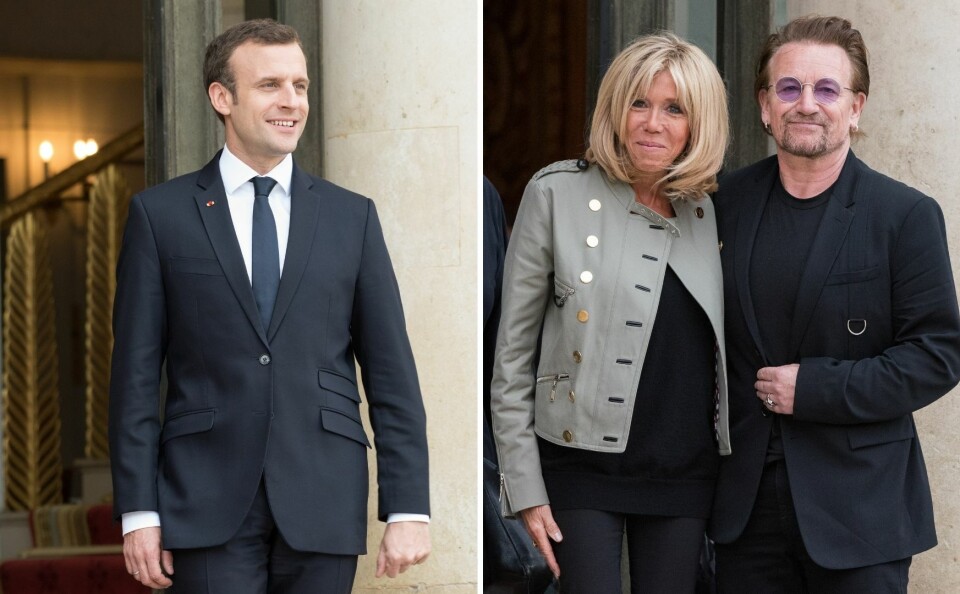-
Letters: France's wasteful healthcare system needs a rethink
Reader says it would not be fair to ask people to pay more based on their age
-
Letters: The reality of finding a new doctor or dentist in France
Finding a replacement is nigh impossible, says Connexion reader in Lot-et-Garonne
-
The magic of mayonnaise: Why a homemade emulsion always woos guests in France
Plus, which shop-bought mayo brand is best?
‘Bono’s praise for Macron reminds French they could do worse’
Commentator Richard Ogier explores the value of a foreigner’s view of France

What’s the value in an outsider’s take on a foreign place? Especially if that foreign place is France, when the French do such a fine and exhaustive job of writing about their own culture and politics themselves.
‘A fresh angle’ would be the journalistic reply, the unfettered response of coming to things free of the insider’s pre-packaged thinking.
Paradoxically, perhaps, in an ‘info-obese’ world of hyper-connectivity, a certain remove can lead to a sort of essentialist, open-eyed clarity.
Bono sees Macron as a problem-solver
The influential singer-songwriter and activist, Bono, was promoting his new autobiography on French radio recently.
In it, he talks about the world leaders he’s met and worked with, including Emmanuel Macron.
In Surrender: 40 Songs, One Story, Bono describes the French president as more like the boss of a Silicon Valley start-up than a classical political leader.
“He solves problems. He rolls up his sleeves, he’s there,” he told France’s top-rating breakfast radio programme.
“He says, ‘How do we fix this?’ His verbal alacrity, his intellectual acuity… frankly, this doesn’t happen all the time.”
Best known as frontman of the Irish supergroup, U2, Bono added: “Not all the leaders of the world are as smart. They know how to speak, or can be warm or charismatic, but you need a certain level of intelligence… To see how he works to solve problems is something to witness.”
Read more: Elections, pension reform, defence: French politics in 2023
Read more: Stunt or useful?: Macron’s new council for democratic decision-making
Macron is no enigma compared to other French presidents
This was intriguing for Bono’s French media hosts, because, they said, “for us,” meaning, it seemed, the French, “he’s an enigma”.
But is he? And if he is, should he be? Until the advent of the peripatetic Nicolas Sarkozy — a “spinning top”, Bono said on France Inter — there was almost always a sense of enigma shrouding the office of the French president, and thus its incumbent.
From the haughty Valéry Giscard d’Estaing, with his Auvergne family chateau — 1,200m² amid 15 hectares of park, French garden, prairie and wood — to ‘Le beau François’ Mitterrand, a byzantine, proudly inscrutable potentate of the left.
Mitterrand orchestrated his own assassination attempt (the Observatory Affair), had a secretive second family, and dined illegally on a pigeon-like ortolan under a white cloth days before he passed, the bird drowned whole in Armagnac. It was eaten bones and all, a feast memorably evoked in a famous Michael Paterniti Esquire article called ‘The Last Meal’.
Foreign observer can add value
Almost 20 years ago, the English historian Perry Anderson — facing down the challenge of writing about France amid the mass of French self-description — rued that there were already more than 3,000 books on De Gaulle written in French, some 200 on Mitterrand.
Many were “dross and mere logomachy”, he conceded, but “statistical rigour and analytic intelligence” distinguished much of the writing.
The answer he proffered to the foreign observer’s dilemma, was the “advantages of estrangement” — the ‘regard lointain’ of anthropologist Claude Lévi-Strauss.
In simpler terms, the value-add is of a different vantage point.
Read more: ‘Is French President Macron right or left-wing? It depends’
We are changed by French way of doing ‘stuff’
Those of us lucky enough to live in France usually feel profoundly marked by the place, its depth, detail and diversity.
Move on, as I did to Munich for seven years, and you come to realise that the way the French do even the stuff of daily life — food, wine, lighting a shop front — has left its imprint, becoming part of one’s internal prism, through which every other ‘elsewhere’ is now viewed.
What one sees through the prism is not always positive, of course.
The incapacity of the ‘individualist’ French to find and mobilise collective solutions is part of the reason for France’s relative decline as a leading light on public policy (in industry, industrial relations, energy, education, health, the welfare state).
Other countries — Britain, Austria, Italy — don’t have the influence of yesterday, either, but for different reasons.
Bono knows France could do worse than Macron
France, with the glories of its history, is still inclined to think that solutions lie in looking backwards to even the recent past. Germany, for obvious reasons, does not.
Listening to Bono’s comments felt like a light bulb moment. You could almost hear his French hosts drawing in air.
Contemplate the cast of presidents since De Gaulle, alongside the difficulties the country currently faces, and it’s hard not to conclude it could do worse — usually has — than back an intellectually brilliant problem-solver, his sleeves up, alive in the moment.
Related articles
Macron should look to history to get a better handle on Putin
The best quips from French politicians in 2022
New leader of French Les Républicains party is ‘right of right’
























